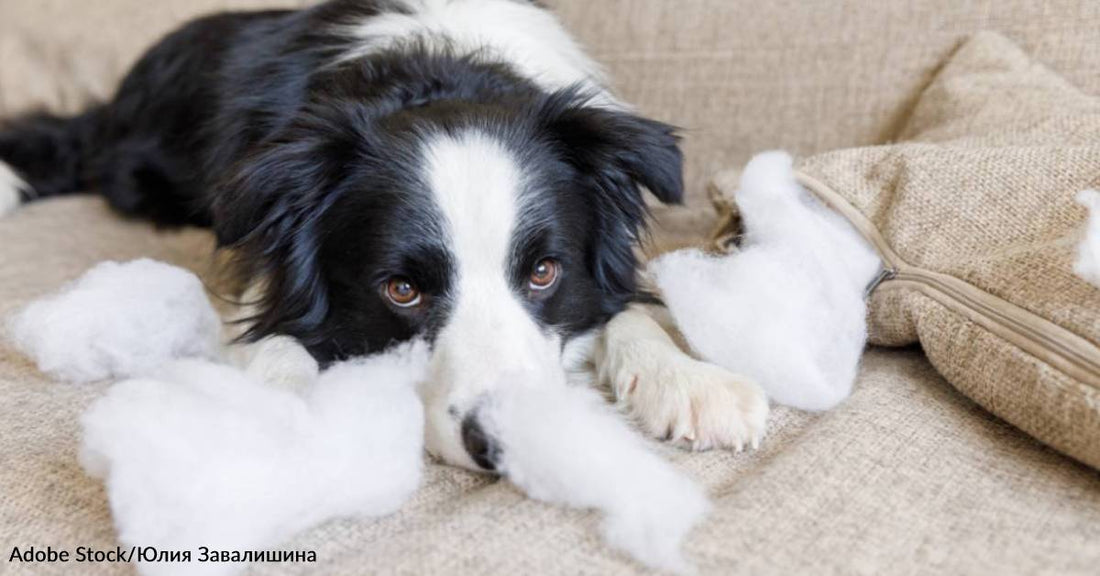How to Discipline a Puppy Without Being Mean
Amanda Guagliardo
New puppies are the best! They're cute and playful and snuggly, most of the time. But puppies can also be mischievous. They'll pee on the floor, bite your ankles and chew up your new shoes. So, how do you get your new puppy to stop being naughty, without being mean? Learn the basics of how to properly discipline your new pup, to make sure you're doing it correctly.
When can you start to discipline a puppy?
Young puppies have short attention spans but you can expect them to begin to learn simple obedience commands as young as 7 to 8 weeks of age.
3 Simple Obedience Commands
- Sit
Down
Stay
Formal dog training has traditionally been delayed until 6 months of age. Actually, this juvenile stage is a very poor time to start. Use treats and food to lure your puppy away from biting your feet. Distract them with a toy rather than your shoes. Be consistent and start early in your training.
Is it OK to punish your puppy?
Your new puppy should look at you as their caregiver and protector. So, no, it's never ok to punish a puppy. Young puppies most likely will have no idea what you are punishing them for if you discipline them. At this age, they can't comprehend what went wrong when you use yelling, time-outs, or even smacking as a consequence of their behaviors.
How to Discipline Your Puppy Correctly
With positive reinforcement also comes the negative and there are some correct ways to actually discipline a new puppy.
Is your puppy chewing everything?
Give them something they are allowed to chew. A new chew toy or bone to redirect their puppy chewing is the best way to correct this.
Is your puppy going potty in the house?
Think about their schedule and if you're taking them outside enough? Once a puppy is older, he'll be able to hold it, but for now, your puppy should be going outside as much as possible.
Immediately call out the negative behavior
If you get home from work and notice your dog peed on the floor at some point throughout the day, you shouldn't scold him then. It's important to discipline your pup as soon as he does something wrong. Puppies have a short memory and scolding him for something he did hours ago isn't going to help. Immediately call out his undesirable behavior when it happens.
Be consistent with discipline
Be sure to discipline your puppy the same way every time, no matter the time or place. If your new dog is punished for barking at the neighbors on Tuesday but you decide to let it slide on Wednesday, he's going to be confused and won’t learn the desired behavior. Stay set in your ways and your new puppy will eventually catch on.
Use noise effectively
Experts say to never yell or shout at your puppy. But instead use noises effectively to train your pup. A loud noise, like clapping or yelling could agitate or excite your pup, which might encourage negative behaviors. A lot of dog trainers use click devices to help train dogs. If you're not using a clicker or some type of tool, try adding one. Be sure that your dog's only form of exercise isn't coming from training, as often, dogs with energy to burn cannot and will not focus on their training sessions.
Reinforce positive behavior
Rather than punishing your dog for his mishaps, try rewarding him for his accomplishments. When he goes potty outside, reward him with a treat for his desirable behavior. If he stays and sits when you ask, reward him again. Be consistent. Using positive reinforcement to train your dog is the best way for him to learn. Smart management, setting them up for success, and rewarding good choices is a much better and proven way to teach your dog what you want.
Avoid these mistakes when training your puppy
New dog owners often make mistakes when they first get a dog. Training a new puppy takes time and effort, you should avoid the following things as a pet parent.
Never use physical punishment
Never hit or scold your dog for bad behaviors. The biggest mistake a new puppy owner can do is hit their dog. Hit your puppy, and you will create a fearful adult dog who knows nothing of trust. We are smart humans who can find a hundred ways besides hitting to modify bad behavior. Do not hit, kick or grab your dog.
Don't scream or yell constantly
As said above, yelling or screaming at your dog can actually cause bad behavior. When you use yelling, he likely has no idea what that means and how to learn from it for your puppy's behavior. You could create fear within your pup rather than a positive outcome. If your puppy does something wrong, try a timeout instead. Removing your dog from the situation and putting him in timeout for a short period of time is a good way to discipline him.
Don't encourage inappropriate behavior
Although some things may be funny when a dog is young, it's important to never encourage bad behavior. Puppies will jump on your guests and may show dominance and these actions may be cute and funny at the time, but never laugh or encourage these things. Make sure you discipline your puppy in the moment and give him treats for his good behavior.
How to correct common behavior problems
Puppies are naturally playful and can be troublesome. There will be times when your pup gets into some trouble. As a puppy parent, you should learn how to correct their behavior problems before it's too late.
Biting / Nipping
Biting and nipping is common puppy behavior. A new puppy will use their sharp teeth to bite your hands and ankles. Puppies aren't biting because they want to hurt you, puppies usually bite because they are teething or trying to play. Chew toys will help to distract your new dog from biting you. Get your puppy plenty of safe bones and durable chew toys so they keep from biting the things they're not supposed to.
Excessive Barking and Whining
Signs of excessive barking and whining could be linked to something more. You'll want to make sure you understand why your pup is barking or whining too much before you can address it. Your dog may have separation anxiety or be hurt. Speak with your vet about this behavior if you're concerned.
Chewing furniture or household objects
Puppy proofing your house is key when you first bring a dog home. A new puppy will inevitably try and chew on everything, including furniture, TV remotes, couches, and more. Make sure your dog is in an area where he can't chew the furniture or get to anything he's not supposed to. Encourage appropriate chewing by providing proper dog chew toys.
Peeing in the house
Some would say potty training is the hardest part of dog training. But, you must remember accidents will happen. The more you take your puppy outside the better chance he'll have at not going inside. Be consistent, take him outside as often as possible, and if your dog does go pee in the house, never rub their nose in it. After you see your pup going pee inside, immediately take him out to his known pee spot, remind him to go potty outside. If he does go outside, reward him with a treat. Don't punish him for peeing inside.
Should you consider a professional dog trainer?
Some dogs need a professional trainer and some don't. Once you've spent some time with your dog, you should be able to know if he needs a trainer or not. If you're being consistent and everything you're doing isn't working, then maybe it's time to consider puppy classes or a trainer. The good news is, dog training can start at any age.

















